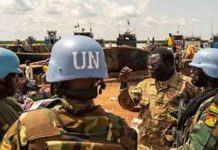TAWILA, SUDAN, AUG 12 (DNA) — In the cholera-stricken refugee camps of western Sudan, every second is infected by fear. Faster than a person can boil water over an open flame, the flies descend and everything is contaminated once more. Cholera is ripping through the camps of Tawila in Darfur, where hundreds of thousands of people have been left with nothing but the water they can boil, to serve as both disinfectant and medicine.
“We mix lemon in the water when we have it and drink it as medicine,” said Mona Ibrahim, who has been living for two months in a hastily-erected camp in Tawila.”We have no other choice,” she told media, seated on the bare ground. Adam is one of nearly half a million people who sought shelter in and around Tawila, from the nearby besieged city of El-Fasher and the Zamzam displacement camp in April, following attacks by the paramilitary Rapid Support Forces (RSF), at war with Sudan’s regular army since April 2023.
The first cholera cases in Tawila were detected in early June in the village of Tabit, about 25 kilometres south, said Sylvain Penicaud, a project coordinator for French charity Doctors Without Borders (MSF). “After two weeks, we started identifying cases directly in Tawila, particularly in the town’s displacement camps,” he told media. In the past month, more than 1,500 cases have been treated in Tawila alone, he said, while the UN’s children agency says around 300 of the town’s children have contracted the disease since April.
Across North Darfur state, more than 640,000 children under the age of five are at risk, according to UNICEF. By July 30, there were 2,140 infections and at least 80 deaths across Darfur, UN figures show.Cholera is a highly contagious bacterial infection that causes severe diarrhoea and spreads through contaminated water and food. Causing rapid dehydration, it can kill within hours if left untreated, yet it is preventable and usually easily treatable with oral rehydration solutions.
More severe cases require intravenous fluids and antibiotics.Ibrahim Adam Mohamed Abdallah, UNICEF’s executive director in Tawila, told AFP his team “advises people to wash their hands with soap, clean the blankets and tarps provided to them and how to use clean water”. But in the makeshift shelters of Tawila, patched together from thin branches, scraps of plastic and bundles of straw, even those meagre precautions are out of reach.— DNA

















